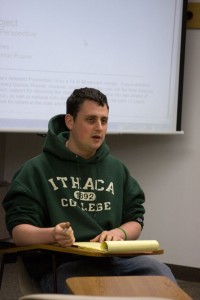Based on the medical amnesty policy recently implemented at Ithaca College, students under the influence of drugs or alcohol who call public safety for help receive no guarantee they will not be referred for alcohol and drug violations.

So far all nine of the students who have taken advantage of the program have been granted medical amnesty. The pilot program, which was put into action this semester after being drafted by several students in the college’s chapter of Students for Sensible Drug Policy, will be assessed at the end of this academic year.
The group’s goal was to encourage students to reach out for help free from fear of judicial consequences.
At the college, students who call on behalf of themselves or a friend may or may not be granted medical amnesty depending on the judgment of Mike Leary, assistant director of judicial affairs.
Leary said he checks if students have broken the conduct code in the past, their compliance with responding officers and whether or not they have been previously granted medical amnesty.
“If public safety shows up and the student is swearing or, say, throws a punch at them, then it would not be medical amnesty because there are other violations there,” he said. “However, if [public safety] shows up and the student is cooperative and asking for help, then that qualifies for medical amnesty.”
Leary said 22 students have been transported to Cayuga Medical Center for alcohol-related incidents as of yesterday. Of these 22, six called and were granted medical amnesty. The other three who were granted amnesty were not taken to Cayuga Medical Center.
According to the national SSDP website, about 91 colleges have some type of medical amnesty policy in place. While SSDP does not offer a standard picture of what a medical amnesty policy looks like, the majority of affiliated schools require that students call campus security before they are eligible.
Leary said having one person responsible for granting amnesty creates a more consistent system.
Sophomore Mark Singer said he is skeptical about this aspect of the program because it does not guarantee that a student who calls will receive amnesty.
“If I was really sick, I guess [calling] wouldn’t really be up to me,” he said. “They need to have a program that does what it says it will do, which is guarantee that if you reach out for help, you will be granted amnesty.”
With these changes, Singer said he would be more inclined to use the program for himself or others if there was ever a need. Until then, he said he would try to keep it between himself and friends.
Cornell University’s medical amnesty program was implemented in September 2002 but with different requirements than the college. Rather than have one person grant amnesty, police grant the student amnesty. Mary Beth Grant, judicial administrator at Cornell, then reviews the report for approval.
“I can either revoke it or give a student amnesty if they weren’t [given it] originally,” Grant said. “I like the system that [the college] has. It’s set up much better than ours because in our system there can be a lot of miscommunication. I wish we had thought about that.”
The college’s amnesty program also dictates that students can only receive amnesty once during their time at the college. At Cornell, there is no limit on the number of times an individual can receive amnesty.
Evan Nison, president of SSDP, was a part of the discussion as the college’s policy was being drafted. He said the school was concerned that the policy could be abused.
“There were some concerns when we were drafting it that [the students] would know police were coming, and they would call and say that somebody needs medical assistance just to get out of punishment,” he said. “We needed a way to deal with that type of situation.”
Sophomore Allison* said her friends feared being judicially referred after reaching out for help while drunk. After drinking,
Allison said she felt sick and asked her friends to call for help.
“I’m glad that there is a medical amnesty program,” she said. “Even my friends were mad that I had somebody call because they were afraid of getting in trouble.”
Nancy Reynolds, director of the Health Promotion Center, said students participate in an alcohol abuse prevention program after receiving amnesty. The program requires students to attend one of two meetings before being released without a record of misconduct.
“It puts them in a confidential and nonjudgmental environment where they can talk in private about any problems they’ve been having,” Reynolds said.
Reynolds said she never pushes students to change their ways, and that decision is up to them.
Reynolds said she is confident the numbers will increase as students become more aware of the program and considers the policy a success so far.
Nison said he thinks students will begin to embrace the policy.
“People will be more trusting of the system as time passes,” he said. “For nine students to use this policy after only a semester, I would call it extremely effective.”
*Name has been changed to protect anonymity.







